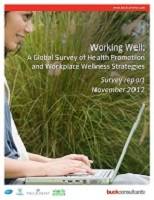March 4, 2013
Nearly all UK employers now offer flexible working, claims survey
 A new report from the Institute of Leadership and Management claims that as many as 94 per cent of UK employers now offer staff some form of flexible working arrangement. The study of more than 1,100 UK managers found that around three quarters (73 per cent) of respondents said their organisation actively supported flexible work practices, 82 per cent were aware of the benefits of flexible working and nearly two thirds (62 per cent) said that senior managers led schemes by example. There is still work to be done in gaining universal acceptance however with 50 per cent of managers claiming flexible working is now standard practice .
A new report from the Institute of Leadership and Management claims that as many as 94 per cent of UK employers now offer staff some form of flexible working arrangement. The study of more than 1,100 UK managers found that around three quarters (73 per cent) of respondents said their organisation actively supported flexible work practices, 82 per cent were aware of the benefits of flexible working and nearly two thirds (62 per cent) said that senior managers led schemes by example. There is still work to be done in gaining universal acceptance however with 50 per cent of managers claiming flexible working is now standard practice .

























March 2, 2013
Google and Yahoo office strategies teach us the value of the velvet glove
by Mark Eltringham • Comment, Facilities management, Technology, Workplace, Workplace design
More →